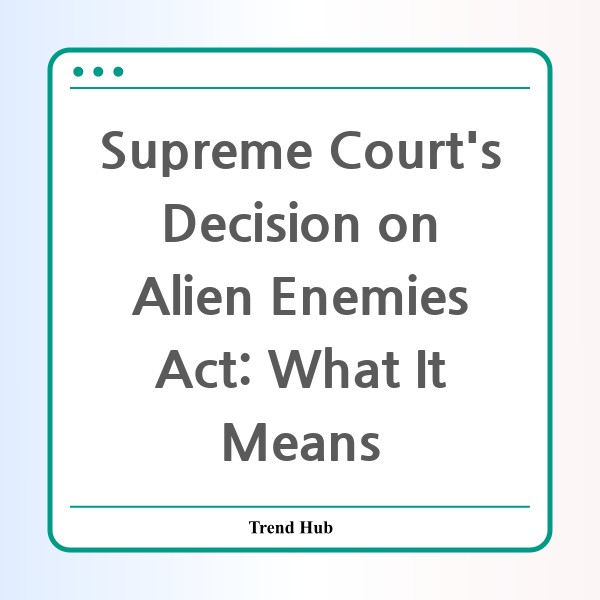* This website participates in the Amazon Affiliate Program and earns from qualifying purchases.

In a significant move, the Supreme Court has placed a temporary block on the enforcement of the Alien Enemies Act, impacting the deportation of Venezuelan nationals. This decision comes at a time when the legal and ethical implications surrounding immigration policies in the United States are under intense scrutiny. How does this ruling reflect on the current political landscape and what are its implications for the future of U.S. immigration law?
The Alien Enemies Act, originally enacted in 1798, gave the government broad powers to deport non-citizens from enemy nations during wartime. However, its application in modern contexts has raised serious legal questions. Recently, the Trump administration sought to invoke this law to expedite the deportation of Venezuelans, labeling them as gang members. The Supreme Court's ruling effectively halts these deportations, at least temporarily.
One of the key points of contention in this case has been the treatment of detainees. Many Venezuelans in custody were facing imminent deportation without adequate notice or the opportunity to challenge their removals legally. Justice Brett Kavanaugh noted that the expedited nature of these proceedings did not meet the due process standards expected within the legal system.
Moreover, the Supreme Court criticized how the Trump administration handled the removals, stating that the short notice provided to detainees—sometimes as little as 24 hours—did not allow sufficient time for individuals to assert their rights. This ruling underscores the importance of due process in immigration cases, aligning legal requirements with humanitarian considerations.
In a dual impact, the Supreme Court's decision not only blocks the application of the Alien Enemies Act for the time being but also necessitates that lower courts reassess how such cases should be managed. The court sent the matter back to the 5th Circuit Court of Appeals, indicating that the legal questions surrounding this act must be comprehensively reviewed to ensure justice is served.
Another significant aspect of this ruling is that it represents a broader struggle over immigration policy during a time of political turbulence. With ongoing debates about the treatment of immigrants and national security, the Supreme Court's decision serves as a reminder of the judicial system's role in balancing executive power with individual rights.
As the legal battle continues, both the Trump administration and immigrant rights advocates are poised for further developments. The American Civil Liberties Union has already filed numerous lawsuits to protect migrants targeted by the Alien Enemies Act, indicating that this issue is likely far from resolved.
In conclusion, the Supreme Court's decision to block the enforcement of the Alien Enemies Act highlights critical legal and ethical issues surrounding immigration policy in the United States. As the case unfolds, it will shape the future interpretations of immigration laws and the protections afforded to non-citizens. With ongoing legal challenges and potential new policies on the horizon, the landscape of U.S. immigration law remains as complex and contentious as ever.
* This website participates in the Amazon Affiliate Program and earns from qualifying purchases.